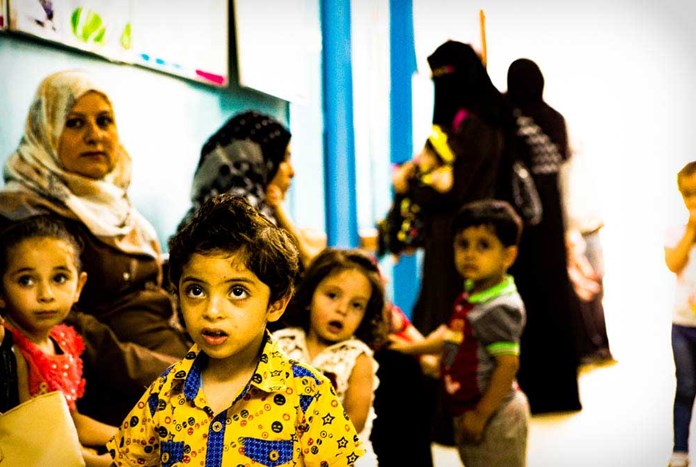Gaza is smaller than the Isle of Wight - 25 miles long by only 5 miles wide but with an astonishing 1.8 million people living there. It makes it one of the most densely populated places on the planet. Lindsey Sharpe picks up the story.
30% of the children who are seen in the Al Ahli clinic are malnourished. This might be due entirely to poverty and food insecurity, but tests are always performed and very often there are parasites or infection present in the children from the contaminated water.
In November I was invited by Amos Trust to join a small team to visit Amos partner, Al Ahli Hospital in Gaza, to ask about their work and find out how we can support them.
I set about doing some research and went off to Gaza armed with lots of facts. It’s smaller than the Isle of Wight – just 25 miles long by 5 miles wide. An astonishing 1.8 million people live there, making it one of the most densely populated places on the planet.
Gaza has been under siege since 2007, meaning that supplies can’t easily get in and Gazans are unable to get out of the tiny strip of land without negotiating an incredibly complicated permit system. 80% of Gazans are dependent on humanitarian aid, 10% of Gazan children are malnourished and 30% are anaemic.
A grim picture:
We entered Gaza by the one remaining road, the Erez crossing. Then we made the twenty-minute journey to Gaza City and were whisked into a whistle-stop tour of Al Ahli Christian Hospital by the Director, Suhaila Tarazi and Medical Director, Dr Maher Ayyad.
Some more depressing statistics:
- 57% of Gazans live in families which are ‘food insecure’ by WHO standards – they simply do not have enough to eat
- the unemployment rate is the highest in the world at 43% – 60% for youths
- 90% of the water is contaminated and unsafe.
The work the hospital is undertaking is very impressive – regular surgery, a burns unit for children, physiotherapy for victims of the 2014 war, psychosocial support for children and adults who are suffering trauma as a result of the war and a comprehensive breast screening service.
Of the 1.8 million population, only 1,300 are Christian. It was challenging and humbling to speak with these staff, who are wholly committed to showing Christ’s love in serving the poorest people in Gaza, regardless of their religion. One of the most impressive departments was the children’s malnutrition clinic.
Some more depressing statistics:
- 57% of Gazans are ‘food insecure’ by WHO standards – they simply do not have enough to eat
- the unemployment rate is the highest in the world at 43% and runs at 60% for young people
- 90% of the water is contaminated and unsafe.
I came to Gaza with a handful of heartbreaking statistics and a sense of apprehension but I came away with my head and heart full of the extraordinary people I had met there.
30% of the children who are seen in the Al Ahli clinic are malnourished. This might be due entirely to poverty and food insecurity, but tests are always performed and very often there are parasites or infection present in the children from the contaminated water and they need treatment for this alongside dietary help.
Mariam is just a year old and is one of the children on the malnutrition programme where 180-200 children are treated every three months. You can see from her chart that she weighed only 7.41 kg (16.5 lbs) when she first attended the clinic but after five weeks she had gained over a kilo and had also grown three centimetres in height.
Dr Su’ad Obed, the nutritionist, was highly skilled. We watched her conduct an interview with Mariam’s mother, beginning with a discussion of what foods were available in the home rather than some unrealistic ideal. As well as advice, fortified biscuits are given to supplement the children’s diet.
So, I came to Gaza with a handful of heartbreaking statistics and a sense of apprehension but I came away with my head and heart full of the extraordinary people I had met there.
There is an Arabic word ‘sumud’ which roughly translated means ‘steadfastness’. Many Palestinians I have met over the years in Israel and the West Bank possess this quality. To quote the singer Martyn Joseph, they do not have "the luxury of despair". Life has to continue under the Israeli Occupation, whatever the circumstances. However, to see these embattled and imprisoned people demonstrating this amount of resilience and positivity was inspirational.
Mariam’s progress is one small instance of the huge success of the malnutrition programme. The treatment is free to patients but there is obviously a cost to Al Ahli Hospital, which they have asked Amos to help with.
Please consider contributing to this important work:
- £150 would cover one child’s treatment for three months
- £50 would cover costs for one month.
Let’s support Al Ahli in this fantastic project. Simply click here to give to this amazing project.
Lindsey Sharpe
Amos supporter
















